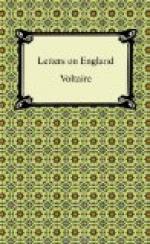“I shall leave,” says he, “to those who know more of this matter than myself, the examining whether the soul exists before or after the organisation of our bodies. But I confess that it is my lot to be animated with one of those heavy souls which do not think always; and I am even so unhappy as not to conceive that it is more necessary the soul should think perpetually than that bodies should be for ever in motion.”
With regard to myself, I shall boast that I have the honour to be as stupid in this particular as Mr. Locke. No one shall ever make me believe that I think always: and I am as little inclined as he could be to fancy that some weeks after I was conceived I was a very learned soul; knowing at that time a thousand things which I forgot at my birth; and possessing when in the womb (though to no manner of purpose) knowledge which I lost the instant I had occasion for it; and which I have never since been able to recover perfectly.
Mr. Locke, after having destroyed innate ideas; after having fully renounced the vanity of believing that we think always; after having laid down, from the most solid principles, that ideas enter the mind through the senses; having examined our simple and complex ideas; having traced the human mind through its several operations; having shown that all the languages in the world are imperfect, and the great abuse that is made of words every moment, he at last comes to consider the extent or rather the narrow limits of human knowledge. It was in this chapter he presumed to advance, but very modestly, the following words: “We shall, perhaps, never be capable of knowing whether a being, purely material, thinks or not.” This sage assertion was, by more divines than one, looked upon as a scandalous declaration that the soul is material and mortal. Some Englishmen, devout after their way, sounded an alarm. The superstitious are the same in society as cowards in an army; they themselves are seized with a panic fear, and communicate it to others. It was loudly exclaimed that Mr. Locke intended to destroy religion; nevertheless, religion had nothing to do in the affair, it being a question purely philosophical, altogether independent of faith and revelation. Mr. Locke’s opponents needed but to examine, calmly and impartially, whether the declaring that matter can think, implies a contradiction; and whether God is able to communicate thought to matter. But divines are too apt to begin their declarations with saying that God is offended when people differ from them in opinion; in which they too much resemble the bad poets, who used to declare publicly that Boileau spake irreverently of Louis XIV., because he ridiculed their stupid productions. Bishop Stillingfleet got the reputation of a calm and unprejudiced divine because he did not expressly make use of injurious terms in his dispute with Mr. Locke. That divine entered the lists against him, but was defeated; for he argued as a schoolman,




